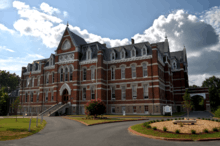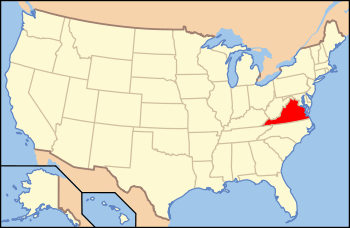The Miller School of Albemarle
| Miller School of Albemarle | |
|---|---|
|
Mind, Hands and Heart | |
| Address | |
|
1000 Samuel Miller Loop Charlottesville, Virginia, 22903 USA | |
| Information | |
| School type | Co-ed day & boarding |
| Founded | 1878 |
| Founder | Samuel Miller |
| Head of school | Board of Trustees |
| Headmaster | Rick France |
| Grades | 8-PG |
| Enrolment | 180 |
| Average class size | 10 |
| Color(s) | Teal and green |
| Athletics | Baseball, basketball, conditioning, cross country, equestrian, golf, lacrosse, tennis, soccer, volleyball, wrestling, Endurance Team |
| Mascot | Mavericks |
| Affiliation | VAIS |
| Boarding | 60% of student body |
| Day students | 40% of student body |
| Co-educational ratio |
Boys: 65% Girls: 35% |
| Curriculum | College Preparatory |
| Website | http://www.millerschool.org |
The Miller School of Albemarle is a coeducational day and boarding college preparatory school outside Charlottesville, Virginia, USA, for students in grades 8 - PG. It opened its doors in 1878 with 33 students. One of the nation's oldest coeducational boarding schools, girls first enrolled in Miller in 1884. In 2006-2007, Miller School entered its 129th year with 145 students. The school is situated 12 miles (19 km) west of Charlottesville and the University of Virginia, on a gently rolling 1,600-acre (650 ha) campus. It was designed by Albert Lybrock.[1]
History
Miller School was founded in 1878 with a bequest of $1.1 million from Samuel Miller, who, as a boy, romped with his brother on the very area on which the school bearing his name is now situated. Near the village of Batesville, Virginia, Samuel Miller was raised in poverty by a mother who realized the value of education and who ensured that Samuel was tutored by a teacher who lived nearby. As an adult Samuel earned his living as a merchant, and his charity became legendary in his adopted hometown of Lynchburg, Virginia.
His will provided for the majority of his estate to be used for the establishment of a boarding school for orphaned children, a school to be located near his birthplace in Albemarle County. By 1874, following Mr. Miller’s 1869 death and the resolution of several legal disputes that arose as children of Mr. Miller’s sought to challenge his bequest, architects and builders began designing and constructing The Miller Manual Labor School. This work culminated in August, 1878, with a grand opening and dedication of the central portion of “Old Main”, an impressive structure of [Victorian architecture], around which much of Miller School life still revolves. "Old Main" is now on the Virginia Historic Landmarks Registry
Timeline
- 1878: The first curriculum was designed; students received instruction in the classics as well as instruction in agriculture and such trades as carpentry and metal work.
- 1882: The first baseball team won its initial game, a 55-0 victory over Fishburne Military School.
- 1883: Thomas Edison’s company designed and supervised the installation of Miller School’s first electric power plant, two Edison Style “K” dynamos and 250 incandescent light bulbs.
- 1884: Girls board at the school.

- 1927: With mounting operational expenses and little fund-raising, Miller School began to cut its programs; the girls program was the first to go, not returning until the early 1990s.
- 1939: Began to phase out its farming operations and, instead, leased the land to generate income.
- 1948: Won the annual interschool boxing championship.
- 1950: Began to charge tuition to supplement its trust funds, which no longer generate sufficient yearly revenues to support the school.
- 1951: As military schools reach new heights of popularity in post-World War II America, Miller School went military with its program.
- 1964: 224 boarding boys were enrolled at Miller School, many of them 5th and 6th graders supervised and guided by Thomas F. Hart.
- 1967: School was racially integrated.
- 1984: Miller became a founding member of the Virginia Association of Independent Schools and charted a course toward a college preparatory curriculum.
- 1992: The school accepted boy and girl day students.
- 1994: A girls boarding program began; the military program was de-emphasized (and eventually eliminated).
- 1999: New state legislation was passed to give Miller School more flexibility and authority in the appointment of members of its own Board of Trustees; sports teams begin to win championships again.
- 2001: A student was awarded the first-ever Emily Couric Award for Leadership, given annually to a young woman in central Virginia who demonstrated by her good deeds the high ideals, work ethic, and leadership qualities of the late State Sen. Emily Couric
- 2003: A Point Guard was named VIS Division II Player of the Year.
- 2004: The school adopted a Strategic Plan, expanded its Board of Trustees, and recommitted to a college preparatory curriculum, and set up a Development Office.

- 2006: A Point Guard was named VIS Division II Player of the Year.
- 2007: The largest senior class in Miller School's history was established with 42 students.
2006: The boys varsity baseball team won its first state championship title.
- 2007: The school's historian, Peggy Flannagan, died at 101 years old.
- 2007: A Power Forward was named VIS Division II Player of the Year.
- 2008: School changed its colors from maroon and gray to teal and green. The mascot was no longer the Red Devil; Miller School's athletic teams compete as the Mavericks.
- 2008: A Power Forward was named VIS Division II Player of the Year.
- 2009: The boys varsity basketball team won its first state championship title.
- 2010: The girls varsity basketball team won its first state championship title.
- 2011: The girls basketball team wins back to back state championships.
Historic buildings
|
Miller School of Albemarle | |
 | |
| Location | Southeast of Yancey Mills off VA 635, near Yancey Mills, Virginia |
|---|---|
| Coordinates | 38°0′21″N 78°42′4″W / 38.00583°N 78.70111°WCoordinates: 38°0′21″N 78°42′4″W / 38.00583°N 78.70111°W |
| Area | 90 acres (36 ha) |
| Built | 1874 |
| Architect | Anderson,D. Wiley |
| Architectural style | Gothic, High Victorian Gothic, Other |
| Governing body | Private |
| NRHP Reference # | 74002102[2] |
| VLR # | 002-0174 |
| Significant dates | |
| Added to NRHP | February 15, 1974 |
| Designated VLR | April 17, 1973[3] |
The school includes architecture designed by D. Wiley Anderson. It was listed on the National Register of Historic Places in 1974. The listing includes three contributing buildings on 90 acres (36 ha).[2]
Honor Code
The Honor Code at Miller School is "I will not lie, steal, or cheat, nor will I tolerate any violation of the honor code by any other student."
The Honor Code is administered in large part by an Honor Committee of student and faculty members. The Honor Committee which conducts hearings with respect to allegations of Honor Code violations. These hearings are conducted in private.

AP courses
English Literature, English Language, U.S. History, Modern European History, Environmental Science, United States Government, Calculus AB, Calculus BC, French Literature, Spanish Literature, Spanish Language, Economics
Elective offerings
Visual Arts, Photography, Performance Arts, Woodworking, Music, and Drama
Community outreach
Students do a service project from 13:00 to 15:00 (EDT/EST) every other Wednesday. Students work with organizations such as Habitat for Humanity or the local hospitals and other need-based organizations. Miller School awards 35% of the student body with need based financial aid.
Extracurricular programs
The school has a National Honor Society Chapter. Membership in the National Honor Society is based on a combination of factors, including overall GPA, leadership within the school community and service to the wider community. Students who are inducted into the NHS serve as peer tutors during their time at Miller. In addition, the Society performs some sort of community service each year, whether by volunteering with a local organization or raising money to support a local charity.
The student run "Miller School Publications" distributes The Devil's Advocate, the school newspaper which includes student activities, world news, movie reviews, and interviews. Light upon the Hill, the art literary magazine showcases student prose, poetry, photography and art work. "The Hill" is the nickname that students call the campus.
Student government
Miller School has a student government which consists of a student body President, Vice President, Secretary, and Treasurer. Each student grade has two class representatives which represent their classes during student government meetings. The student government works with the school's administration to represent the views of the students in decisions made which affect the student body. The student government works with the school's administration and board of directors to raise money and orchestrate student activities such as dances and balls with other boarding and day schools, and student requested dress down days, which are days where the school's dress code does not apply.
Miller school in popular culture
- Used for the exterior and interior scenes of the boarding school attended by the characters in the film, Toy Soldiers
- Used for the exterior and interior scenes of the boarding school attended by the characters in the film, Major Payne
- Used for the opening sequence of the boarding school attended by the characters in the film, Morgan Stewart's Coming Home
- Used for the opening credits fly-over sequence in the film, Cry Wolf
References
- ↑ Morson's Row April 2013 ArchitectureRichmond
- ↑ 2.0 2.1 "National Register Information System". National Register of Historic Places. National Park Service. 2010-07-09.
- ↑ "Virginia Landmarks Register". Virginia Department of Historic Resources. Retrieved 05-12-2013. Check date values in:
|accessdate=(help)


